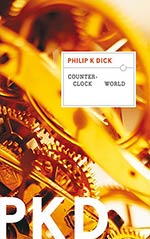
![]() niriop
niriop
7/8/2020
![]()
When I read Confessions of a Crap Artist last year, I thought this was it: the worst book PKD ever wrote. An unbelievably boring work of domestic drama that ultimately amounts to nothing.
And then, a week ago, I picked this up off the shelf (after some thirteen years of ownership) and I had to revise my revelation.
Now, just to clarify: Confessions is still the worst book, but that's due to its plot and characterisations, not it's prose, which is perfectly serviceable if unremarkable. With Counter-Clock World, the reverse is true: the plot is good and the characters passable, but the writing really is some of the very worst PKD ever did. There are some passages in earlier chapters that would be enough for me to put the book down if it were another author. The action throughout is poor, both in the sense of generally what the characters are physically doing, and the depictions of interpersonal violence and upheaval.
I picked this one off the shelf largely becasue I knew it concerned the depiction of a United States divided along racial lines--very relevant for our moment. Although this is invoked strongly multiple times, ultimately it isn't used in a way more fitting or interesting for the plot. For exmaple: The Anarch Peak could've just been a religious leader, rather than a racial touchstone, and it wouldn't have really mattered.
The core narrative device of the "Hobart Phase" (backwards travelling time on Earth, resutling in reversed biological and physical processes) is also treated inconsistenetly; for example, cigarette smoke is sucked out of the air into tobacco and smoking papers, but why is information still processed going forward for the characters? Wouldn't they be unlearning information as the narrative went on? It doesn't make much sense.
Of his middle period books, this has to be one of the most theologically inclined, well before his "VALIS" period; each chapter is epigraphed with a quote from a medieval Christian philosopher such as Boethius or Aquinas, but Erigena in particular (of whom I cannot remember much). These thinkers are eventually discussed in the text, but only very briefly, along with the Greeks and some of the early modern philosophers. However, in terms of philsophical discussion, it is no Deus Irae.
All in all, this was definitely one of the "written on methamphetamines very quickly" novels, created to sustain oneself not "wow".
In the end, I would only recommend this for seasoned "Dickheads" of the obsessive variety.